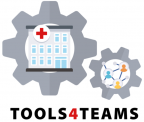Recruiting organisation: Department of Public and Occupational Health at the Amsterdam University Medical Center, the Netherlands
Supervisors: Prof. Martine de Bruijne; dr. Marijke Melles, Thijs Rietjens, Marit B. Hagland
Doctoral Candidate: Carla Molenaar
Secondments: Caresharing in the Netherlands (3 months); Valide AS in Norway (3 months)
Summary: The purpose of this project is to adapt, test and implement a digital information integration platform to support transmural care provided by care teams, consisting of professionals in primary and secondary care, the patient and his/her informal care givers. The goals of the project will be achieved through: (1) Investigating the needs, values, facilitators and barriers of stakeholders involved in transmural elderly care by literature review; (2) Explore specific contextual challenges for transmural team functioning and identify specific design opportunities using human centered design research techniques (i.e. a sociotechnical system perspective including stakeholder mapping, context mapping and patient journey mapping); (3) Iterative adaptive design of (extensions of) the information integration platform with support for transmural teams; (4) identify and understand cross-national differences in contextual challenges and use of transmural support tools for transmural care teams; and (5) Evaluate the impact of a tailored integration information platform to support transmural care teams.
Background
Care for chronic patients, for instance vulnerable elderly patients, diabetes patients or orthopaedic patients, is provided by multiple care teams working for different care organisations, e.g. hospitals, general practice and long term community care services. Each of these care domains not only has its own organisational structure, but also its own information infrastructure. This makes it hard to communicate information to obtain a complete picture of the patient situation when care needs to be provided by displaced teams.
In the Amsterdam region a network communication platform is currently implemented to support transmural teamwork. The purpose of this project is to further develop, test and implement a digital network communication platform to support transmural care provided by care teams, consisting of professionals in primary and secondary care, the patient and his/her informal care givers.
Approach
To achieve the goals of this project we will: (1) Investigate the needs, values, facilitators and barriers of stakeholders involved; (2) Explore specific contextual challenges for transmural team functioning and identify specific design opportunities using human-centered design research techniques (i.e. a sociotechnical system perspective including stakeholder mapping, context mapping and patient journey mapping); (3) Iteratively design (extensions of) the information integration platform with support for transmural teams; (4) Identify and understand cross-national differences in contextual challenges and use of transmural support tools for transmural care teams; and (5) Evaluate the impact of a tailored integration information platform to support transmural care teams.
The studies will result in a review of contextual challenges and information needs of transmural care teams, a tailored information integration platform to support transmural care teams and guidance for end-users and policy makers.
Our research team
The Doctoral Candidate will join the Department of Public and Occupational Health at the Amsterdam University Medical Center and will collaborate closely with the Department of Human-Centered Design of the Faculty of Industrial Design Engineering at Technical University of Delft.
The Doctoral Candidate will complete two secondments during the studies. The second year starts with a three month secondment at the company Caresharing, to work on iterative design of the tailored information integration platform for transmural elderly care teams. In the third year, a three months secondment follows at Valide AS in Stavanger (Norway) to obtain insight in cross-national differences is challenges and use of support tools for transmural elderly care teams.
“Tools4Teams” is an EU-funded doctoral network, that investigates different instruments and tools to support teamwork in different parts of the healthcare system. Tools are technical as well as procedural. The network allows the various PhD candidates in a variety of European countries to meet and to learn with and from each other and the collective group of PhD supervisors. The consortium brings together the leading researchers on team processes in their various forms and applications. The network activities will support the mutual exchange of candidates and supervisors in unique ways, such as spring and winter schools and network wide meetings with both academic and non-academic partners.
Amsterdam UMC
The Amsterdam UMC is the largest hospital and foremost medical research institution in the Netherlands with over 13,000 employees, combining what were previously the Academic Medical Center and Vrije Universiteit Medical Center. The location of Amsterdam UMC at De Boelelaan is part of the Vrije Universiteit Amsterdam. Some 2500 staff members are fully or partially employed in medical research. Amsterdam Public Health Research Institute is one of the 8 research institutes of Amsterdam UMC that conducts world-class research with about 1700 researchers in 9 research programs, including Digital Health and Quality of Care (see Amsterdam Public Health (amsterdamumc.org)). Amsterdam UMC houses high quality core facilities including an eHealth Living and Learning Lab.
